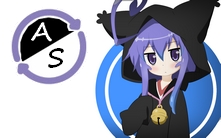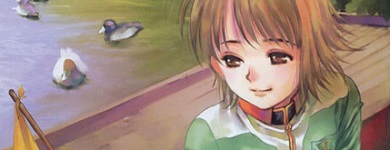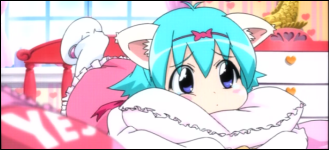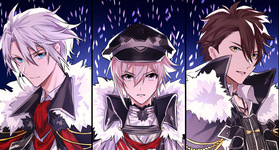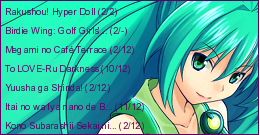When I first started this, there were so many possibilities running through my mind. Uncovering the truth of the outside world, the conspiracy of the wall, the true nature of the day of flight, the origin of the Haibane. Instead, all I got was a slice of life dealing with characters coming to terms with themselves. And you know what? That's perfectly fine. That's all I want at this point.
This episode's atmosphere was absolutely stunning, particularly when Reki's cocoon dream took form. It gave an urgent sense of despair hopelessness, conveying Reki's feelings of being lost. Ultimately she had spent all of this time seeking salvation, but wouldn't reach out in fear of her true self being rejected. That's something that hits home all too well. Just like the crow, Rakka saved Reki. I was surprised that they immediately went to her day of flight, but it seemed well deserved at that point. I like how they describe Reki as a stepping stone to guide the other Haibane, as it's now Rakka's turn to step forward and do her part to guide the next generation.
Haibane Renmei did a phenomenal job at building up a mystery all the while delivering everything in a straightforward manner. The day of flight, for example, had me guessing at all kinds of wild possibilities and ideas. Instead of being a dreadful plot to destroy the Haibane, it was simply a coming of age rite that is accepted as it is. The communicators and Toga performed their duties as per their customs, never plotting or hiding anything from the Haibane.
Speaking of customs, I really like how Haibane Renmei shaped its own culture and set of customs. It felt like an authentic examination of another culture's way of life and was something that was far from my comfort zone, but could still be respected.
Overall I like how this started out as a lighthearted slice of life and its transition into a gripping mystery leading to Reki and Rakka's redemption.
8/10
Edit:
After putting some more thought into it, I feel as though Haibane Renmei was able to strongly convey three messages to me:
1. The Haibane actually strongly resemble humanity. Similar to them, our origins, why we're here, and where we go are all shrouded in mystery. Arguably there are several beliefs and ideas on those topics, but there is no clear evidence to answer the mystery of how and why this world exists. This leads to many of Rakka's dilemmas being very relatable. Despite not choosing to be born, it is our responsibility to adapt and seek out a means of survival if we choose to live on.
2. The second point that really got me was, once again, how authentic the culture and its customs feel. It is rare to come across one as organic and believable as this one in anime, especially with how it's treated with respect and dignified obedience.
3. Although it's never directly stated, I believe it's implied that the Day of Flight is a release for the Haibane that can only be obtained after they have resolved the issues most personal to them. Whether it's by having a wish fulfilled or facing one's inner demons, a few of the main characters exemplify this idea.
Rakka - being forgiven for whatever she did in her past life by burying the crow. It means she's been cleansed from being sin bound and can move on.
Reki - accepting her true self and trusting Rakka to believe in and support her.
Kuu - talked about how she always wanted a younger sister and was happy that she finally got one with Rakka.
Nemu - Nemu has two conditions that need to be fulfilled. The first was completing that book about the Haibane and god. The second was that she wanted Reki to embark on her Day of Flight first. It wasn't shown in the anime, but it seems subtly implied that she'll be next.
I wish I could make more sense of this, but I'm typing on the border of passing out from sleep deprivation so this is all I can manage.
As a result, I'm going to raise my initial 8/10 to a 9/10. Slice of life at its finest. |





